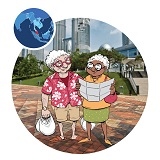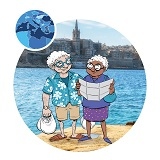Jan 2, 2019
MoneyTalk: Dream retirement spots
Presented by:


Thinking of skipping town, for good, when you retire? Here are some luxury locales that may even help you stretch your retirement dollar further.
Athough some of us may not mind living out our older years enjoying grey skies and snow in Canada, the cliché of a happy retirement usually involves an exotic, temperate and idyllic setting. Statistics Canada notes that many foreign-born Canadians leave Canada and return to their country of origin as they age. For example, the majority of Canadians who had moved to Italy between 2000 and 2003 were Italian-born. Over half (52 per cent) of these returning immigrants were over the age of 50.
“Retirement is a unique experience that depends largely on finances,” says Sandra Bussey, High Net Worth Planner at TD Wealth. “One of the major decisions that can affect how much you need to save, or your quality of life, will be where you live.”
Whether you were born abroad or not, here are a few colourful spots to get you thinking about where you would like to live out your best years:
Retiring in Boquete, Panama
 Savings needed to retire today for 15 Years (2 People): $390,000
Savings needed to retire today for 15 Years (2 People): $390,000
(Rounded, $29,000 per year adjusted for 2 per cent inflation, living in city centre, rent for one bedroom apartment, moderate eating out and entertainment costs, capital would continue to be invested over retirement)
Over the past 30 years you needed to save per month: $600 CAD
(Rounded, assuming 3.75 per cent after tax return on investment)
Just like other countries in the region, Panama has a low cost of living. Modern, comfortable and tolerant, Panama actively recruits retirees with easy-to-obtain visas and other perks such as discounts on hotels, movie tickets, prescriptions and restaurants.
But, temperatures in Panama can hover around 30 degrees Celsius, and that can be hard to take on a daily basis. Most locals drive everywhere and it is not pedestrian friendly.
Retiring in Escazu, Costa Rica
 Savings needed to retire today for 15 Years (2 People): $463,000
Savings needed to retire today for 15 Years (2 People): $463,000
(Rounded, $35,000 per year adjusted for 2 per cent inflation, living in city centre, rent for one bedroom apartment, moderate eating out and entertainment costs, capital would be continued to be invested over retirement)
Over the past 30 years you needed to save per month: $700
(Rounded, assuming 3.75 per cent after tax return on investment)
Costa Rica is relatively inexpensive, politically stable, offers good health care and some of the most incredible natural environments the world has to offer. It’s modern and has reliable infrastructure. No wonder that the country has become so popular among retirees looking for a high quality of life at a low cost. The cost of labour is also low, meaning that you might be able to employ household help when and if you need it.
Chances are, to live comfortably in Costa Rica, you will be living outside of an urban centre. That means that you will be away from major amenities and conveniences that you may be used to having at your fingertips.
Retiring in Kuala Lumpur, Malaysia
 Savings needed to retire today for 15 Years (2 People): $363,000
Savings needed to retire today for 15 Years (2 People): $363,000
(Rounded, $27,000 per year adjusted for 2 per cent inflation, living in city centre, rent for one bedroom apartment, moderate eating out and entertainment costs, capital would continue to be invested over retirement)
Over the past 30 years you needed to save per month: $550
(Rounded, assuming 3.75 per cent after tax return on investment)
Malaysia is known for its tropical climate and its relaxed lifestyle. It boasts idyllic islands, stunning beaches, good healthcare, and good, inexpensive food and shopping. The government has been actively recruiting foreign retirees to relocate there. Malaysia’s cities have all the amenities that a westerner would demand. Some nice perks: unlike some other countries, all funds brought into Malaysia are tax free, including pensions and investment income from overseas. Plus, the cost of fuel in Malaysia is subsidized.
Monsoon season is rarely fun, however, and those lightning storms can be scary. It rains more days than not in Malaysia.
Retiring in Malaga, Spain
 Savings needed to retire today for 15 Years (2 People): $412,000
Savings needed to retire today for 15 Years (2 People): $412,000
(Rounded, $31,000 per year adjusted for 2 per cent inflation, living in city centre, rent for one bedroom apartment, moderate eating out and entertainment costs, capital would continue to be invested over retirement)
Over the past 30 years you needed to save per month: $635
(Rounded, assuming 3.75 per cent after tax return on investment)
Although not the only region in Spain, many foreigners flock to the Costa Del Sol; it offers near perfect weather and English is widely spoken in the quaint seaside towns. The Eurozone crisis has also meant that housing prices have plummeted. People are leaving Spain for work elsewhere in droves but if you are retired, and don’t need work, this is an opportune time to move in!
Some parts of Spain can get uncomfortably hot in the summer months, and foreigners who have any income above $24,000 may have to file a Spanish income tax return. The Costa del Sol, as well as Barcelona and Madrid, can have a high cost of living.
Retiring in Valletta, Malta
 Savings needed to retire today for 15 Years (2 People): $530,000
Savings needed to retire today for 15 Years (2 People): $530,000
(Rounded, $40,000 per year adjusted for 2 per cent inflation, living in city centre, rent for one bedroom apartment, moderate eating out and entertainment costs, capital would continue to be invested over retirement)
Over the past 30 years you needed to save per month: $800
(Rounded, assuming 3.75 per cent after tax return on investment)
Malta sounds luxurious and pricey, but it is actually very affordable. The island has mild weather, and English is the official second language. It offers a laid-back Mediterranean lifestyle with good food, culture and modern first world amenities and infrastructure. You won’t need a car, as Malta has an excellent network of buses and ferries. It’s also an easy jaunt to Paris and other European cities. The country’s healthcare is considered to be above average by Europoean standards.
English is spoken widely, Maltese is still the primary language, and not speaking it may make some feel like an outsider. Foreigners can also have a difficult time with local banks, and experience issues with simple banking, such as obtaining a debit or credit card.
Moving abroad for your retirement isn’t something to take lightly; if you find you aren’t happy in your new locale, it’s not that easy to undo. “I suggest that anyone thinking of retiring abroad visit the location several times,” says Bussey. “Look at different areas, and research amenities and services for each.”
Bussey suggests you make a thorough list of what is important to you when you retire, and don’t just think about life now, think about your needs later. “You will likely need good healthcare, and help as you age. Are those available to you in the location you are considering?” Also consider safety and security, language barriers if any, and residency requirements.
Not included in the costs above are moving costs, legal fees, taxes, health care costs over and above government programs,and the cost of currency exchange and fluctuation. “If the location you choose uses the US Dollar or Euro, you’ll need to take those fluctuations into account when determining your financial needs when you retire,” says Bussey. Keep in mind that if you are further away from retirement, many things can change that would affect your decision to relocate, including, but not limited to, political stability, taxation, crime rate, and other government policies.
And importantly, you should discuss your finances with a knowledgeable financial professional who understands the tax laws of the country that you are considering a move to. “For tax purposes, you may have to sever ties with Canada,” says Bussey. “You may lose your government benefits however, like access to Canadian health care; but currently, even if you are not resident in Canada, you can still receive your Canada Pension Plan.”









